Cape Falcon Marine Reserve: Dive into the Science
The marine reserve serves as an important site for scientific research, conducted by professionals, organizations, and community scientists
ODFW Science Monitoring at Cape Falcon Marine Reserve
The ODFW Marine Reserves Program uses a variety of research tools to monitor marine reserves. ODFW staff, along with researchers and scientists from other organizations, tailor which tools they use at the Cape Falcon site based on the site’s unique characteristics. The reserve’s size, habitats, and depths—as well as what fishing activities used to take place here—all play into determining which tools we use.
The Cape Falcon Marine Reserve is dominated by soft bottom habitats. The site also includes some small, low-relief, rock patches in shallower waters that are isolated from any other rocky habitat in the nearby area. Prior to closure, there was crabbing in sandy habitats, and infrequent fishing for groundfish in rocky habitats, within what is now the reserve. These characteristics – including the relatively low fishing pressure on groundfish that previously occurred at the site – means we will likely not see changes as a direct result from marine reserve protections (i.e. no fishing) in the reserve compared to areas still open to fishing.
Monitoring Activities
The ODFW Marine Reserves Program is studying both the ecology and the human dimensions of Cape Falcon Marine Reserve and its four other sites.
To help us understand changes occurring in the marine environment, scientists collect data on fish and invertebrate species, seaweed, habitat characteristics, and oceanographic conditions. They track changes over time in regard to organism size, organism abundance, and community composition.
Human dimensions research is primarily looking to understand the potential effects of marine reserves on different types of stakeholder groups—from commercial and charter fishermen to recreational visitors, coastal residents, business owners, and others.
This is a long-term research and monitoring program. What ODFW is learning from these living laboratories is being used to support the management of marine reserves, sustainable nearshore ocean resources, and coastal communities.
Find out more About the Science.
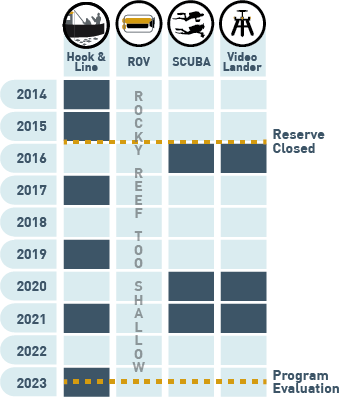
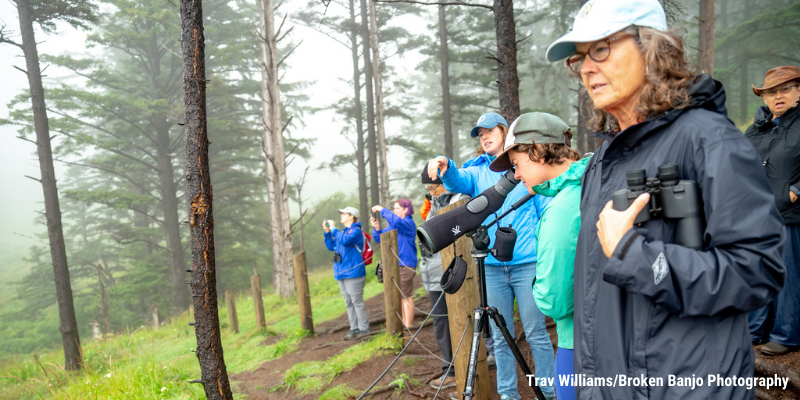
Get Involved: Community Science
We have much to learn about Oregon’s ocean and beaches. Community science is the collection and analysis of data relating to the natural world by members of the public, typically as part of a collaborative project with professional scientists. Participation is fun and rewarding—join us and contribute to science!
What Community Science is Happening at Cape Falcon?
There are numerous ways to get involved with the Marine Program of NCLC. Here are some of the different activities we oversee or participate in on an annual basis:
Sea Star Surveys
This is a new program for CFMR, which runs from spring to fall and is in partnership with MARINe. Sea Star Surveys monitor the health of sea star populations on the US West Coast after an initial sea star wasting event in 2013.
Volunteers are asked to sign up for at least three shifts of three hours each. Shifts occur one hour before and one hour after minus tides events. Volunteer surveyors should be interested in interacting with wildlife and detailed work as the program focuses on finding, measuring, and documenting the size and physical state of sea stars in the reserve. This project takes place in the intertidal zone of Falcon Cove Beach.
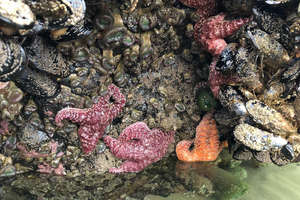
Tidepool Ambassador Program
The Tidepool Ambassador Program (TAP) runs throughout the summer months, in partnership with Oregon State Parks, Oregon Marine Reserves, and the Oregon Coast Visitors Association.
TAP helps visitors understand tidepool etiquette and facilitates their observation of tidepool species through one-on-one or group interpretation. TAP volunteers should be interested in sustained and friendly engagement with visitors and working alongside wildlife. Volunteers are asked to sign up for at least two shifts that are between three to four hours in the morning (generally on the weekends). The minus tide series determines shifts during the summer months. This program takes place in the intertidal zone at Short Sand Beach, Oswald West State Park.
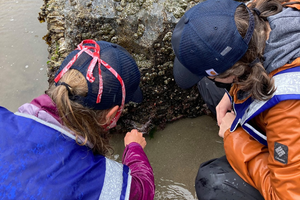
Documenting Oregon’s King Tides
Documenting Oregon’s King Tides corresponds with the winter King Tides series in November, December, and January.
This is done in partnership with the Oregon King Tides Project, which documents the extent of exceptionally high tide events (King Tides) bringing attention to the effects of future climate conditions and sea-level rise. Volunteers utilize a camera or smartphone to take photographs of predetermined photo categories and from specific locations within the reserve during King Tides events. Volunteers should be comfortable with inclement weather. No formal training is required.
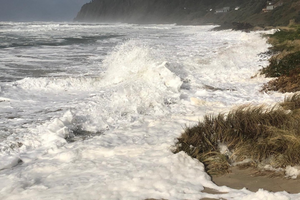
Coastal Bird Surveys and Interpretation Tabling
Black oystercatcher surveys run from spring to summer and partner with Portland Audubon. This project provides a better understanding of coastal bird population dynamics.
Volunteer duties include documenting bird and nest behaviors and communicating about these species to visitors. You should be comfortable looking through spotting scopes/binoculars, taking notes, and connecting with the public. This project takes place at Short Sand Beach and Devil’s Cauldron, in Oswald West State Park. Training by Portland Audubon is required. Training dates listed by species of interest are located here.
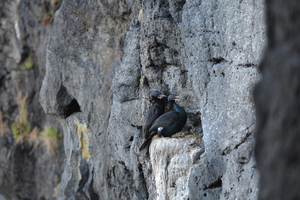
Stay Up to Date with ODFW
ODFW’s goal is to clearly communicate and make accessible the work being carried out by the ODFW Marine Reserves Program. They currently have a variety of ways in which folks can track their monitoring progress.
Visit the Resource Library to see ODFW’s latest infographics, monitoring plans, research reports, journal publications and more. Explore Photos & Videos or check out their Reserves News posts. You can also sign up for their eNewsletter emailed once a month to keep tabs on current research, find out about reports and upcoming events, dive into interesting ocean topics, and hear perspectives from scientists, fishermen, volunteers and community members.